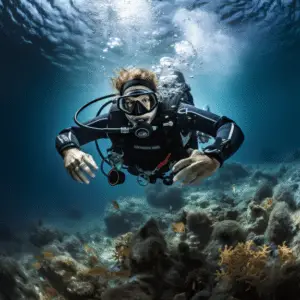
Introduction to Scuba Diving Injuries
Scuba diving can be a thrilling adventure, but it also carries risks. Knowing the basics of scuba diving injuries is essential for anyone wanting to explore the underwater world.
- 1. Injuries may include decompression sickness when you ascend too quickly, causing nitrogen bubbles to form in the body.
- 2. Then there’s barotrauma, which is pressure changes damaging your ears, sinuses, or lungs.
- 3. Lastly, you may get hurt by contact with venomous creatures or through accidents with coral reefs and other underwater structures.
Personal experience is key to preventing these injuries. Diving into the history of scuba diving accidents reveals an interesting story. In 1943, two Frenchmen created the Aqua-Lung, a device that let divers breathe underwater with SCUBA. This invention changed diving, but it also brought its own set of injuries before safety measures were developed.
Knowing about scuba diving injuries is important for all divers, new and experienced. By being informed and following safety protocols, divers can enjoy the underwater world while minimizing the risks. Caution: Scuba diving injuries may happen when your mermaid dreams collide with the ocean’s reality.
Causes of Scuba Diving Injuries
Scuba diving injuries can occur due to various factors. These can range from equipment failure, improper diving techniques, lack of experience, medical conditions, environmental hazards – even human error!
It’s essential to keep these risks in mind:
- Equipment failure – Malfunctioning or poorly maintained scuba gear can lead to accidents and injuries.
- Improper diving techniques – Ascending too quickly or not equalizing pressure can result in decompression sickness or barotrauma.
- Lack of experience – Inexperienced divers may lack the skills to handle emergencies or navigate unfamiliar underwater environments.
- Medical conditions – Asthma, heart problems or ear infections can increase the risk of complications during scuba diving.
- Environmental hazards – Strong currents, poor visibility, marine life encounters or underwater obstacles can all contribute to scuba diving injuries.
- Human error – Negligence, panic or inadequate communication between divers can lead to accidents and injuries.
Plus, keep an eye out for water temperature and depth variations when scuba diving! To stay safe, always follow proper training guidelines and seek regular medical check-ups. And, before each dive, inspect your gear to ensure it’s in working order. This simple checkup can ensure a safe and enjoyable experience.
Types of Scuba Diving Injuries
Do you know that scuba diving can cause injuries? It can happen due to equipment malfunctions, human error, or environmental conditions. Let’s explore some types of scuba diving injuries:
- Barotrauma: It happens when pressure changes rapidly during ascent or descent. It can cause pain, bleeding, or trouble equalizing pressure.
- Decompression sickness: Also known as “the bends”, it is caused by a rapid reduction in pressure during ascents. Symptoms include joint pain, dizziness, fatigue, and paralysis.
- Drowning: It is rare but possible if the diver runs out of air or experiences equipment failure. Thus, one must follow safety protocols to minimize this risk.
- Marine life injuries: Encounters with sea creatures like jellyfish or corals can cause stings, cuts, bites, or puncture wounds. So, one must be careful and respect the marine environment.
Each dive is unique, with risks based on location, weather, and individual factors. Therefore, divers must stay updated with safety guidelines and seek medical care when needed. Always get comprehensive dive insurance coverage that includes emergency evacuation for any unforeseen circumstances. Safety is a priority! Remember, the only way to be safe is to stay on dry land, but that’s no fun!

Prevention and Safety Measures for Scuba Diving
Scuba diving injuries can be prevented and minimized with the right safety measures. Here are some key points to remember:
- Ensure all divers are trained and certified.
- Conduct regular equipment checks.
- Always dive with a buddy.
- Follow recommended depth limits.
Be aware of potential risks like marine life, currents, and underwater hazards. By staying informed and practicing safety, scuba diving injuries are less likely.
A true story highlights why safety is so important: A group of divers went diving without checking their equipment. One diver experienced a malfunctioning regulator at an unsafe depth. His buddy saw the distress signs and helped him back to the surface. This serves as a reminder that following safety measures can make a difference in avoiding accidents and injuries while exploring underwater.
